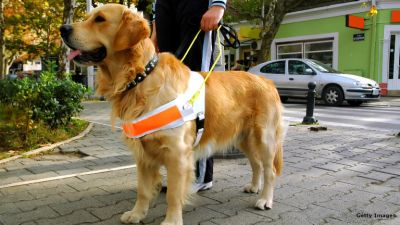In a previous blog article, we discussed the benefits of accepting renters that own pets. Today we are going to look into the matter a little deeper. What about renting to tenants that have service animals? If you, as the landlord, have decided that you definitely do not want animals in your units, you could be in violation of North Carolina Disability Rights. Do you know the laws regarding service animals? Let’s break them down and see which ones applies to us.
The Definition of a Service Animal
Service animals are protected under the Service Animals & the Americans with Disabilities Act (ADA). According to this act, the
“only species of service animal recognized under Title II and Title III of the ADA are dogs and miniature horses.”
The service animal must have been “individually trained to do work or perform tasks for the benefit of an individual with a disability, including a physical, sensory, psychiatric, intellectual or other mental disability.” The law states that service animals are allowed into all public places including hotels and homeless shelters.
Recently there has been a trend towards “emotional support” or “comfort” animals. Some would like them to be considered as service animals. But, under the revised ADA regulations they do not qualify. So Mrs. Mildred’s cat that lowers her blood pressure does not count as a service animal and either does Mr. Winfred’s trained monkey. But according to The Fair Housing Act, emotional support, comfort and assistance animals are covered and are not limited to dogs as long as they have been prescribed by a licensed mental health professional.
Interestingly, the ADA does not require that service animals be registered or certified. The owner does not need to provide a proof of certification or training. Owners can register their service animal, however.
Do You Have to Accept Tenants with Service Animals?
The Fair Housing Act prohibits discrimination in housing on the basis of a disability. It is unlawful to refuse to make reasonable accommodations. “Exceptions to “No Pets” policies have been shown to be a reasonable accommodation. The renter must be able to show a link between his/her disability and the task the animal provides. The landlord has the right to ask questions about the service animal’s training and tasks but they cannot ask the tenant about their specific disability.
This means that a landlord must be willing to accommodate service animals. But, there are some exceptions:
Buildings with 4 units or less and the landlord occupies one of the units.
Single family housing that is rented without a real estate broker.
Accommodating the disability would require the landlord to fundamentally alter the residence.
Can You Charge a Pet Fee for a Service Animal?
Based on the research we have conducted, according to the ADA
“a person with a disability who uses a service animal cannot be… charged fees that are not charged to other patrons without animals. In addition, if a business requires a deposit or fee to be paid by patrons with pets, it must waive the charge for service animals.”
Though you are not allowed to charge a pet deposit or a monthly pet fee, if the pet does cause any damage to the unit, the tenant is required to pay for the repair costs. So, landlords, make sure you do regular inspections and have documented all move-in and move-out damage.
Landlords and Service Animals
So, what does all this mean? It means that Federal Law states that all landlords must take reasonable steps to accommodate tenants that have service or comfort animals. They cannot charge a pet deposit or monthly pet fee but can hold the tenants responsible for any damage. The tenant, however, must also meet the landlord’s standard level of financial and credit worthiness. This means that if the tenant does not meet the landlord’s minimal qualifications which are required by all applicants and is denied the unit, it is not considered discrimination










![Landlord Questions [Top 5 Questions Soon-To-Be Landlords Ask]](https://movezen360.com/wp-content/uploads/2021/01/who-should-manage-my-rental-property-768x432.jpg)